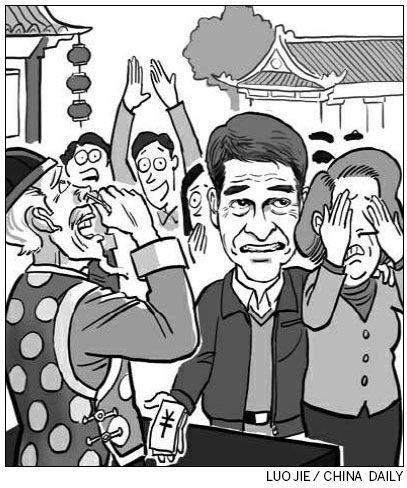A place where magic meets the eye - after going up the nose
By John Clark ( China Daily ) Updated: 2011-12-06 11:03:00
The magician pushed what looked like a large cocktail stick up his nose.
Then he appeared to shove another stick up the other nostril.
My wife had to look away. Was it an illusion? Were the sticks hidden in his hand?
Here's the eye-watering part.
He massaged his nose and the tips of the wooden sticks appeared in the corners of his eyes.
We were visiting Hebei province's Chengde.
The sun was warm in a cloudless blue sky.
We looked out over the roofs of Puning Buddhist Temple north of Chengde.
We saw the largest hand-carved wooden Buddha in the world.
The Guanyin stands more than 22 meters tall and has 44 arms, with an eye on the palm of each hand. I noticed lots of dust on her surfaces and fell to musing about how difficult it must be to dust a Buddha this tall. You would need scaffolding.
At the northern end of the monastery is a wire fence festooned with padlocks. There are thousands of them, some brown with age, others bright shiny brass. Each is engraved with a date. A stall, advertising love, happiness and success, sells padlocks at 30 yuan ($4.70) each.
Couples, lovers, friends and family buy padlocks and attach them to the fence to pledge their eternal devotion. I'm not sure that a brass padlock can secure a bicycle, let alone a happy future. But thousands of visitors appear to believe so.
The magician called out to us as we passed a row of souvenir shops.
He was about 70, wore a colorful Chinese costume and cap, and his blue eyes looked red-rimmed.
He began with the metal cup trick. You know the one where there are three cups and one ball. The conjuror moves them around and the ball is never under the cup you choose.
This guy was good. Then he did his stick trick. You could call it his shtick, except we weren't laughing.
Now, I can appreciate his artistry. I have a blocked tear duct and understand the secret passages between the eyes and the nose.
I told the ear, nose and throat specialist that if I'd known she was going to stick needles in my eyes, I would never have turned up for my appointment.
I felt the needle go deeper and deeper into my tear duct. Then I tasted salty water and knew the blockage was cleared.
Someone shouted: "Money, money" - our cue to fork out for the magician.
I handed over 20 yuan and my wife, who couldn't bear to look because he still had the sticks popping out of his eyes, gave him 10 yuan.
The previous day, we visited Bishu Shanzhuang, the mountain resort at Chengde. It was chosen by Emperor Kangxi in 1703 as a haven from the oppressive summer heat of the Forbidden City.
The imperial palace looks modest from the outside but is richly decorated inside. The collection of porcelain is breathtaking.
We rowed along the lake and explored temples.
Then we bought tickets for a tour on what looked like a big electric golf cart. As we climbed aboard, a woman gesticulated and spoke rapidly in Chinese. I shrugged my shoulders and we were off. There was laughter behind me.
After only 300 meters the cart stopped, everyone got off and a woman with headphones and a microphone launched into her spiel. It was then we realized we had joined a Chinese guided tour group.
We tagged along for a bit, doubtless the butt of jokes, and then slipped away to await another buggy.
Our train to Chengde took four and a half hours to cover the 254 km from Beijing. That's less than 65 km/h.
I idly wondered how long it had taken the emperor and his court in the 18th century. Was he carried or did he ride? Either way, it must have taken a week.
A young Westerner sat across the aisle with two Chinese women and their young sons. The young man shared their snacks.
Later, we chatted. Nils is 19 and finished school. He arrived in China six weeks earlier to work as an au pair for a Chinese family. His friends opted for a gap year in the US.
In the 19th century the mantra to the ambitious young was "Go West, young man".
In the 21st century it's "Go East, young man".
|
|
|
|
|
|
|
|


























 Raymond Zhou:
Raymond Zhou: Pauline D Loh:
Pauline D Loh: Hot Pot
Hot Pot Eco China
Eco China China Dream
China Dream China Face
China Face






